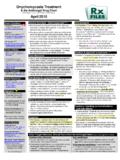Transcription of Heparin-Induced Thrombocytopenia (HIT)
1 Heparin-Induced Thrombocytopenia (HIT). A. What is HIT? Heparin-Induced Thrombocytopenia , or HIT as it is commonly known, is a serious side effect that can happen when you are being treated with heparin . heparin is a medication used to decrease clotting or thin the blood.. Unfortunately, heparin can occasionally lead to low blood platelet counts and to life-threatening blood clots. B. The Basics WHO GETS HIT? Anybody who receives heparin can develop HIT. About 2-3% of patients treated with heparin develop HIT. It can also occur in less than 1% of patients treated with another type of heparin known as low-molecular-weight heparin (LMWH).
2 In the US, tradenames for LMWHs include dalteparin (Fragmin ), enoxaparin (Lovenox ), and tinzaparin (Innohep ). HIT is more likely to occur when higher doses of these drugs are given. But HIT. can also result from very low doses for example, the amount typically used to flush (or clean out) intravenous lines. WHAT IS heparin ? heparin is a medication that is injected into the skin or a vein to decrease clotting, or thin the blood. There are two forms of heparin : unfractionated and LMWH. These medications are used to prevent clots from forming or expanding. For patients confined to hospital beds or who have undergone major surgery, heparin is often used to prevent clots from forming in the veins of the legs.
3 It can also be used to treat heart attack, stroke, deep vein thrombosis (blood clots in the deep veins of the legs or arms), or pulmonary embolus (blood clots in the lung). 1. C. Causes & Complications WHAT CAUSES HIT? HIT is sometimes referred to as heparin allergy. However, HIT is not a true allergy. Rather, it is caused by an overreaction by the immune system to heparin . Normally, our bodies make antibodies to protect us from infection. But for unknown reasons, the immune systems in some patients make antibodies in response to treatment with heparin . When these antibodies form, they bind, or attach to platelets.
4 These platelets then become HERE'S HOW CLOTS CAN FORM IN HIT. activated and begin to form clots at the wrong time and/or wrong place. This can be harmful if the clots block blood flow to or from important parts of the body, such as the heart, brain, or a limb. After antibodies bind to platelets, these platelets are removed from the bloodstream by the body. This can lead to a low platelet count. The medical term for a low platelet count is Thrombocytopenia .. Helpful Definitions: heparin : a medication used to increase clotting or thin the blood . Platelet factor-4 (known as PF4): a small molecule within platelets that is important in the binding process Antibody: a Y-shaped protein made by the body's immune system that binds to foreign substances (such as bacteria and viruses) and inactivate or marks them for removal by other parts of the immune system Platelets: small cell-like particles in the bloodstream that help stop bleeding by forming clots 2.
5 WHAT PROBLEMS ARE CAUSED BY HIT? HIT leads to a low platelet count, but it usually does not lead to bleeding. However, bleeding in the brain (hemorrhagic stroke) and blood loss through the intestinal tract can sometimes occur. Non- heparin blood-thinning medicines (see Table in How is HIT Treated? ) are often used to treat HIT and prevent blood clot(s) from forming or expanding. But these medicines themselves may also increase risk of bleeding. HOW SERIOUS IS HIT? If HIT is not recognized and treated rapidly, there's a 50% chance serious or life- threatening blood clots can form in both arteries and veins.
6 Arteries are blood vessels that carry oxygen-rich blood away from the heart to the body. Veins return blood to the heart from the rest of the body. Clots that form in the arteries that supply blood to the brain and heart can cause strokes and heart attacks. HIT may also cause arterial clot formation in the arms and legs, and a loss of blood supply to these areas. Clots that form in veins can lead to deep venous thrombosis (DVT), which occurs in the deep veins of the legs, arms, or the abdomen. Clots can also occur in the blood vessels in the lungs; this condition is called pulmonary embolism (PE).
7 And clots can occur in blood vessels in the skin, leading to black and ulcerated skin lesions, called skin necrosis. D. Diagnosis & Treatment HOW DO I KNOW IF I'M AT RISK? HIT is a serious medical condition and can even be fatal. You may feel well and have no worrisome symptoms even though HIT is developing. Therefore, your health care providers must periodically check your blood for platelet counts while you are being treated with heparin and for a period of time after receiving heparin . The exact schedule should be determined by your health care provider. Your doctor may suspect you have HIT if: Your platelet count has fallen during treatment with heparin and if you have received heparin for at least 5 days You have been treated with heparin in the last 3 months You develop a new blood clot in spite of being on heparin HIT usually leads to a fall in platelet count of at least 50% (from where it was prior to you receiving heparin ).
8 In rare cases, HIT may be present even though your platelet count has fallen very little, or not at all. 3. HOW IS HIT DIAGNOSED? Your physician may use a scoring system called 4T score to determine your likelihood of having HIT. The 4Ts refer to (1) Timing of the development of low platelets, (2). degree of Thrombocytopenia ( degree of platelet decrease), (3) whether new Thrombosis ( blood clot) has occurred during treatment with heparin , and (4). whether there is an alTernative reason for the low platelet count. If HIT is suspected, testing should be done immediately. Tests most commonly used in diagnosing HIT: PF4/ heparin enzyme immunoassay (ELISA).
9 Heparin-Induced platelet aggregation assay Platelet serotonin release assay Because tests results take time to get (up to several days in some cases), and because HIT requires rapid treatment, your health care providers may decide to treat you for HIT even if the testing has not been completed. In these instances, your health care providers may diagnose possible or probable HIT. Medications for HIT. Route of Dosing Approved in Drugname(tradename) administration frequency for HIT? Lepirudin (Refludan ) IV Continuous Yes Argatroban (Argatroban ) IV Continuous Yes Bivalirudin (Angiomax ) IV Continuous Yes*.
10 Desirudin (Iprivask ) SC Twice daily No Danaparoid (Orgaran ) IV Continuous No SC Twice daily Fondaparinux (Arixtra ) SC Once daily No *Percutaneous coronary intervention only . Not currently available in the US. IV = intravenous SC = subcutaneous 4. Other Available Treatments In addition to treatment with non- heparin blood thinners, your health care providers may also give you longer-term therapy with an oral blood thinner, such as warfarin (Coumadin , Jantoven ). You can start on an oral blood thinner once your platelet count has increased to normal. Treatment with warfarin may be for a few weeks, a few months, or longer, depending mostly on whether or not you have developed a blood clot.






